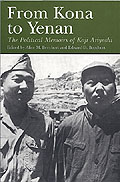By Ann M. Sato
Special to The Advertiser
Koji Ariyoshi, who died at age 62 in 1976, lived the kind of life of which books and films are made — worker, labor activist, writer, editor, public servant, small-business owner, husband and father and member of the maligned Hawaii Seven, who were arrested by the FBI on charges that they were members of the Communist Party bent on bringing down the U.S. government.
It is a life that recalls a distressing period of Hawai‘i history, when Big Five companies and a Caucasian elite dominated every facet of public life, and the system was set up in such a way that it was impossible for most workers ever to get ahead.
Now, Alice M. and Edward D. Beechart, scholars working with the Center for Biological Research at the University of Hawai‘i, have compiled and edited a series of autobiographical articles Ariyoshi wrote in a new book, "From Kona to Yenan: The Political Memoirs of Koji Ariyoshi" (UH Press Biography Monograph series, paper, $19).
Ariyoshi tells of growing up on a Kona coffee farm where workers literally had to steal their own berries in the dead of night in order to make any money. Of spending a year of college in Georgia in order to better understand racial and economic inequality in this country. Of seeing his baby daughter behind bars at Manzanar, and knowing he could never stop standing against injustice.
Ariyoshi had the heart of a reporter; when he wanted to know if there really was a "Tobacco Road," as described in Erskine Caldwell’s classic book, he
didn’t listen to Georgians who denied its existence. He went there, actually touring the poor white areas with
Caldwell’s parents. He retained this clear-eyed hunger for knowledge, and the desire to disseminate it for the good of all, throughout his life. Along with his straightforward, personal writing style, it is an endearing trait and one that brings this book to life.
Tomorrow, the authors and several of Ariyoshi’s friends and colleagues will gather for a celebration of the book’s publication and of Ariyoshi’s multifaceted life. The event is set for 7:30-9 p.m. at the Judiciary History Center, 417 S. King St. Admission is free.
[back to top] |

 The Great Index to Fun
The Great Index to Fun